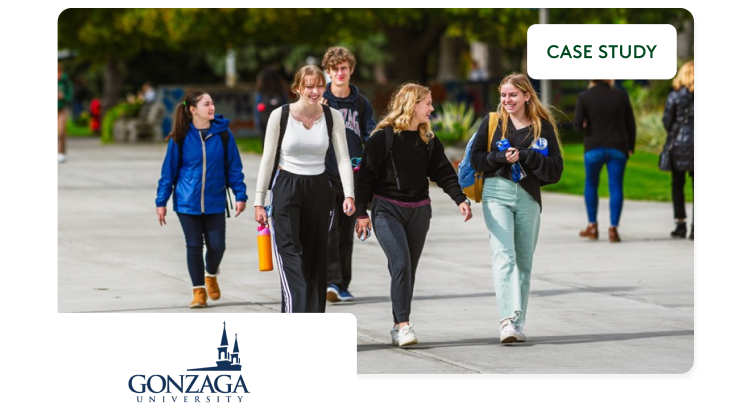Gonzaga University and “whole-person care” for employees
How Hinge Health supports cura personalis
- Hinge Health Learning Center
- Articles
- Gonzaga University Case Study
At Gonzaga University, digital health solutions address access challenges
Long wait times for care are the norm in greater Spokane
A private, liberal arts university in Spokane, WA
7,000 undergraduate and graduate students
Workforce includes faculty and staff members
1,900 benefits-eligible employees
Many employees live in rural areas of Washington and Idaho
At Gonzaga University, digital health solutions address access challenges
Long wait times for care are the norm in greater Spokane
A private, liberal arts university in Spokane, WA
7,000 undergraduate and graduate students
Workforce includes faculty and staff members
1,900 benefits-eligible employees
Many employees live in rural areas of Washington and Idaho
Member testimonial
“For over thirty years, I was told that I’d have to live with the pain. I believed that. Now I know that’s false, that there are many things I can do to strengthen my neck and back and ease those muscles. Many of my days are now pain-free due to Hinge Health and the exercises. That motivates me to continue exercising."
– Gonzaga University employee and Hinge Health participant
About Gonzaga University
As a Jesuit educational institution, one of Gonzaga University’s core values is cura personalis – a Latin phrase that means “care of the whole person.” To support its 1,900 benefits-eligible employees, Gonzaga University’s Benefits team strives to take each individual’s unique needs into account.
In the spirit of cura personalis, the Benefits team has worked over the last five years to bolster the university’s employee wellness portfolio, adding programs like “doctor on demand” telehealth services, virtual physical therapy, virtual counseling, and more.
Gonzaga University’s workforce and benefits challenges
Access to care can be difficult for many of Gonzaga’s employees who live in rural areas. Even in the greater Spokane area, it’s common for people to wait months to see primary care physicians, as well as physical therapists.
To promote awareness of wellness programs like Hinge Health, Gonzaga’s Benefits team uses a multi-dimensional strategy. The “Morning Mail” is a daily email that features information about one benefits program. Hinge Health is included once a week in the “Morning Mail.” “Benefit Bytes” is a bi-weekly email with benefits updates.
Based on claims costs, the Benefits team selects one topic to communicate about exclusively for a two-week period. If MSK claims are particularly high, each day employees will receive information about programs that deal with MSK pain.
Gonzaga University’s MSK benefits program implementation
In addition to improving access to care, Hinge Health addresses the multi-dimensional nature of chronic pain. If an employee is struggling with MSK pain, for example, that can lead to depression and anxiety. Hinge Health addresses all those issues.
Gonzaga University’s employees have embraced Hinge Health. Over a 12-week period, participants:
Completed an average of 36 exercise therapy sessions (about 3 sessions per week)
Had 52 care team interactions (about 8 interactions per week)
Read 20 education articles (about 2 per week)
Experienced a 63% decrease in depression and a 57% decrease in anxiety
Saw a 43% reduction in employee absenteeism and presenteeism
Reported an 8.1 satisfaction rating, based on a scale of 1 to 10

